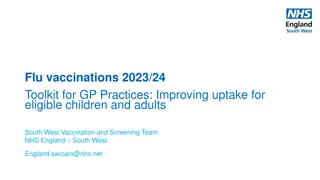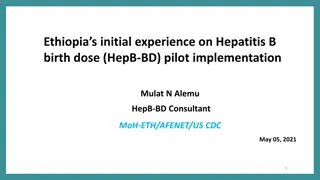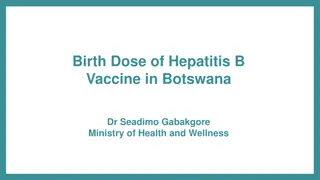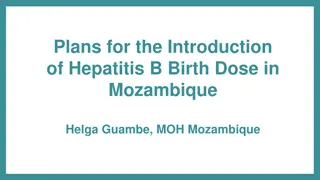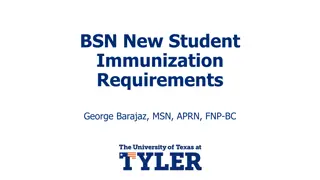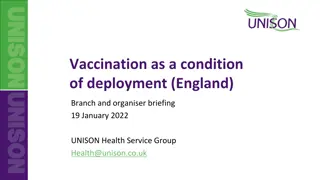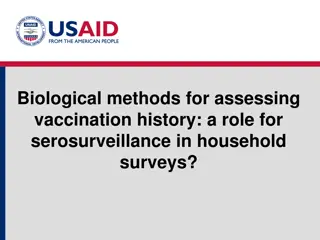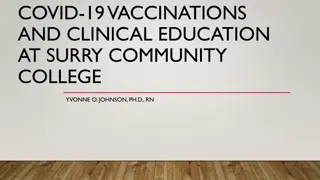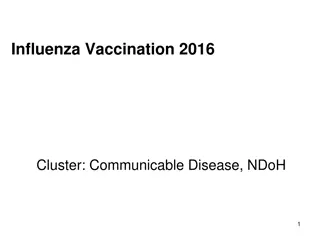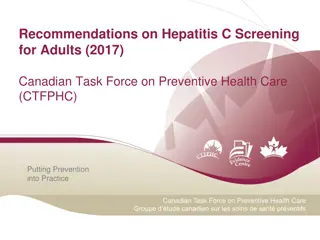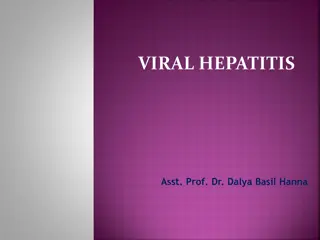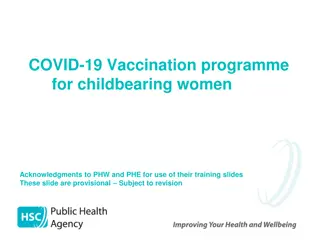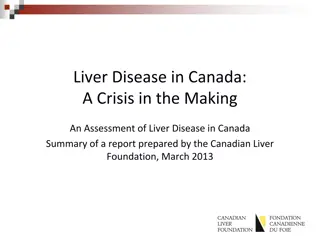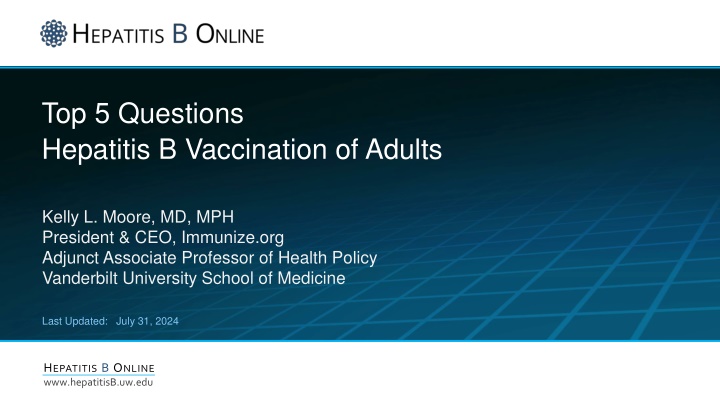
Hepatitis B Vaccination in Adults: Key Questions Answered by Dr. Kelly L. Moore
Gain insights into the top questions surrounding Hepatitis B vaccination in adults, including the importance of universal screening, revaccination considerations, and strategies for managing incomplete vaccination series. Dr. Kelly L. Moore provides expert guidance on why healthcare professionals should prioritize Hepatitis B vaccination in all adults and practical solutions to common vaccination challenges.
Download Presentation

Please find below an Image/Link to download the presentation.
The content on the website is provided AS IS for your information and personal use only. It may not be sold, licensed, or shared on other websites without obtaining consent from the author. If you encounter any issues during the download, it is possible that the publisher has removed the file from their server.
You are allowed to download the files provided on this website for personal or commercial use, subject to the condition that they are used lawfully. All files are the property of their respective owners.
The content on the website is provided AS IS for your information and personal use only. It may not be sold, licensed, or shared on other websites without obtaining consent from the author.
E N D
Presentation Transcript
Top 5 Questions Hepatitis B Vaccination of Adults Kelly L. Moore, MD, MPH President & CEO, Immunize.org Adjunct Associate Professor of Health Policy Vanderbilt University School of Medicine Last Updated: July 31, 2024 HEPATITIS B ONLINE www.hepatitisB.uw.edu
Disclosures Advisory board honoraria to Immunize.org: CSL Seqirus Dynavax GSK Merck Pfizer Sanofi Valneva
Background: CDC Hep B Vaccination, HBV Screening Hep B Vaccination: -1982: First CDC recommendations for HepB vaccination (high risk) -1991: Universal infant Hep B vaccination -1995: Routine catch-up vaccination at age 11-12 years -1999: Routine catch-up vaccination of all age <19 years -2022: Routine catch-up vaccination of all age <59 years Universal Adult HBV Screening: -2023: Screen every adult >18 at least once in a lifetime with a triple panel (HBsAg, anti-HBc, anti-HBs) HepB vaccination history: www.cdc.gov/mmwr/preview/mmwrhtml/mm5125a3.htm#tab CDC screening recommendations: www.cdc.gov/mmwr/volumes/72/rr/rr7201a1.htm
The questions 1. Why should healthcare professionals focus on vaccinating all adults against hepatitis B now? 2. If the patient hasn t been screened for hepatitis B yet, should you screen them before you decide about vaccinating? 3. Do people who were properly vaccinated need to be revaccinated if they have a negative surface antibody (anti-HBs) result on their triple panel screening test? 4. If you re going to give Hep B vaccine and draw the screening hepatitis B triple panel at the same visit, does it matter which one you do first? 5. What do I do if a patient started the Hep B series years ago but never finished? Bonus: How do we avoid the problem of lost records for patients we vaccinate? Content of this talk is from Immunize.org s resource: Implementing Hepatitis B Universal Adult Screening and Vaccination: Clinical Answers for Healthcare Professionals (www.immunize.org/wp-content/uploads/catg.d/p2080.pdf)
Why should healthcare professionals focus on vaccinating all adults against hepatitis B now? Anyone can be infected with hepatitis B: Everyone can benefit from knowing their status and being protected The majority of adults reported to CDC with acute hepatitis B in recent years have no reported risk factor for infection Most adults may find themselves at risk at some point in their lives Rates of infection have been steady or rising in unvaccinated older adults CDC extending protection to all adults in a catch-up vaccination program Goal: Eliminating hepatitis B and the disease it causes Immunize.org: Implementing Hepatitis B Universal Adult Screening and Vaccination: Clinical Answers for Healthcare Professionals (https://www.immunize.org/wp-content/uploads/catg.d/p2080.pdf)
If the patient hasnt been screened for hepatitis B yet, should you screen them before you decide about vaccinating? The priority is generally not to miss an opportunity to vaccinate Vaccination today will help protect a person who needs it No specific risk to vaccinating a person who is immune or infected If screening results show vaccination is not needed, discontinue If screening results later show vaccination needed, fewer visits needed to complete series Content of this talk is from Immunize.org s resource: Implementing Hepatitis B Universal Adult Screening and Vaccination: Clinical Answers for Healthcare Professionals (https://www.immunize.org/wp-content/uploads/catg.d/p2080.pdf)
Does everyone who was properly vaccinated need to be revaccinated if their anti-HBs is negative on the triple panel screen? For most people, the answer is No. Antibody titers naturally drift lower over the years; however, studies have shown the majority of people effectively immunized decades earlier are protected from symptomatic or chronic infection after HBV exposure Revaccination is indicated for certain people at ongoing high risk, e.g.: -Non-responding infant born to HBsAg+ mother -Healthcare providers at occupational risk -People on hemodialysis or those with significant immunocompromise CDC MMWR January 2018 (pp. 23-24) www.cdc.gov/mmwr/volumes/67/rr/pdfs/rr6701-H.pdf. Bruce, et al. Protection and antibody levels 35 years after primary series with hepatitis B vaccine and response to a booster dose. Hepatology 76(4):p 1180-1189, October 2022.
If giving HepB vaccine and drawing the screening HBV triple panel at the same visit, does it matter which you do first? Draw blood for screening first It is possible to detect HBsAg from the HepB vaccine in serologic tests up to 18 days after vaccination CDC recommends obtaining blood for the screening triple panel before administering the first dose of vaccine Alternatively, wait at least one month after administration of the most recent dose of HepB vaccine Content of this talk is from Immunize.org s resource: Implementing Hepatitis B Universal Adult Screening and Vaccination: Clinical Answers for Healthcare Professionals (https://www.immunize.org/wp-content/uploads/catg.d/p2080.pdf)
What do I do if a patient had the first Hep B dose in the series years ago but never finished? No documentation? Start the series as if unvaccinated. Documentation? Administer the next dose due in the series. Content of this talk is from Immunize.org s resource: Implementing Hepatitis B Universal Adult Screening and Vaccination: Clinical Answers for Healthcare Professionals (https://www.immunize.org/wp-content/uploads/catg.d/p2080.pdf)
What do I do if a patient had the first Hep B dose in the series years ago but never finished? See CDC s adult immunization schedule for details: www.cdc.gov/vaccines/schedules/hcp/imz/adult.html Source: Ask the Experts section of Immunize.org: www.immunize.org/ask-experts/topic/hepb/vaccine-recommendations- hepb/
Bonus Question: How do we avoid the problem of lost records for patients we vaccinate? Documentation is important Recipients personal record (taking a photo with their phone is wise) Use your state s immunization information system -Check for your patient s vaccination history -Report doses you administer Minimize unnecessary repeat Hep B evaluation and vaccination Content of this talk is from Immunize.org s resource: Implementing Hepatitis B Universal Adult Screening and Vaccination: Clinical Answers for Healthcare Professionals (https://www.immunize.org/wp-content/uploads/catg.d/p2080.pdf)
Acknowledgments Hepatitis B Online is funded by a cooperative agreement from the Centers for Disease Control and Prevention (CDC-RFA- PS21-2105). This project is led by the University of Washington Infectious Diseases Education and Assessment (IDEA) Program. www.hepatitisB.uw.edu www.hepatitisC.uw.edu www.idea.medicine.uw.edu The content in this presentation are those of the author(s) and do not necessarily represent the official position of the Centers for Disease Control and Prevention.

